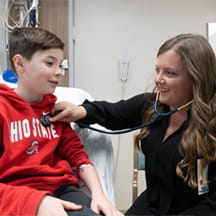Trauma-informed care can help providers reflect on the experiences they bring to medicine, become more aware of the traumas in patients and families, and aid in creating a more caring and understanding medical environment.
Defining trauma-informed medical care
According to the Substance Abuse and Mental Health Services Administration, trauma-informed care is broadly defined as:
• Realizing the widespread effect of trauma.
• Recognizing how trauma may affect individuals (patients and staff included).
• Responding by applying knowledge about trauma into practice to prevent further negative emotional trauma reactions.
Health care organizations should consider emotional trauma exposure and reactions to trauma as they examine and change organizational culture, routine patient care, complex patient care, and support for medical teams and staff.
The presence and prevalence of emotional trauma
Most patients, family members and staff members have been exposed to at least one potentially traumatic event. According to a recent study in Psychological Medicine, 70% of adults worldwide have experienced at least one traumatic event.
A systematic review published in the Journal of Pediatric Psychology indicated 30% of children with medical conditions and their parents experience significant emotional trauma reactions related to the child’s medical condition.
A substantial subset of medical providers is faced with symptoms of burnout due to the stress and emotional trauma reactions of their jobs, and they are faced with new challenges and traumas from the COVID-19 pandemic. Ensuring medical staff can discuss these traumas and obtain support is crucial to their recovery.
Recognizing how emotional trauma is affecting patients and health care teams, the American Academy of Pediatrics (AAP) and other professional organizations made recommendations for integrating support for patients and families, to prevent and treat emotional trauma reactions, and address provider wellness and burnout.
For example, the AAP created a Resilience Project that aims to reduce toxic stress for patients and families and provide guidance on how to become a trauma-informed care practice. The AAP also has resources for physician health and wellness, including ways to intervene in four areas: individual resilience, practice environment, advocacy and learning environment.
Identifying trauma
Trauma reactions in patients, families and staff members include:
• Avoidance. Trying not to think about an event, avoiding contact with anything that is a reminder of an event.
• Arousal. Increased physiological body responses when faced with the reminder of a traumatic event.
• Re-experiencing. Getting stuck thinking about the event; flashbacks; nightmares.
• General changes in mood.
Symptoms of secondary traumatic stress in providers, or compassion fatigue, include these symptoms, as well as guilt, anger, problems sleeping, challenges with concentration, exhaustion and an impaired immune system.
Incorporate trauma-informed care training
Creating a health care environment where we realize past emotional traumas can affect how patients interact with providers can ease tensions and provide support for patients and families. Health care leaders can prioritize training on trauma-informed care to help staff recognize trauma reactions in colleagues and themselves. Institutions can fund and support programs aimed at responding to patients and staff that have experienced trauma to improve wellness and health care delivery.
To start, organizations can build interdisciplinary teams to create training sessions tailored for disciplines and medical subspecialties. Align training with institutional priorities, such as improving patient satisfaction or decreasing staff burnout.
Changing small parts of the presentation, such as case examples or common problems for a certain population type (e.g., cancer versus non-accidental injuries), can help with engagement and relatability with the training material.
Try training small a group first, get their feedback and revise as needed. Then open training to a wider audience once the material has been refined. In training nearly 300 health care professionals at Kentucky Children’s Hospital in Lexington, Kentucky, a 50-minute session was sufficient to increase providers’ confidence in delivery of trauma-informed medical care—this increase in confidence was retained six months later.
Over 98% of those who participated in the training said they acquired new skills, and more than 90% said they would recommend the training to others. The training has spurred further unit level debriefing sessions and regularly scheduled emotional support sessions for staff at Kentucky Children’s Hospital.
One participant said, “Implementing trauma-informed care changed my practice by helping me remain aware of the history people bring with them and patients’ perception of potential trauma.”



